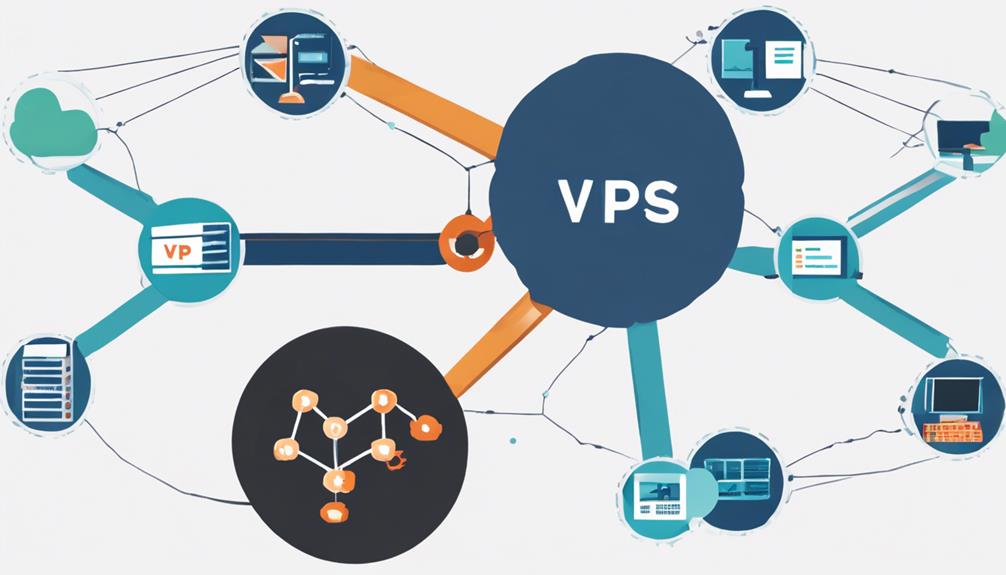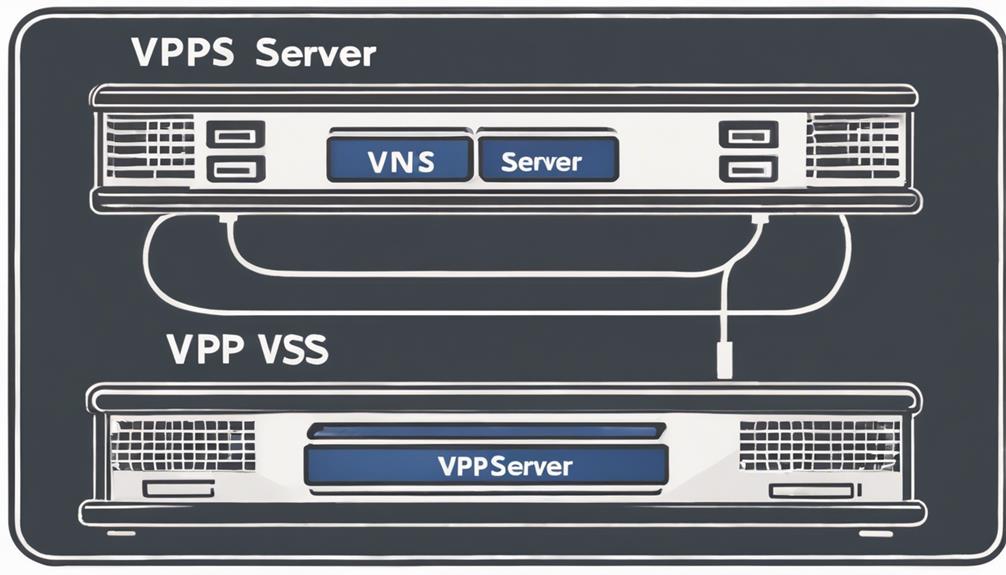In the comparison between VPS and VPN, VPS excels in providing dedicated server resources and customization for hosting websites and applications, making it ideal for businesses seeking tailored hosting solutions. On the other hand, VPN focuses on cybersecurity, encrypting internet traffic for enhanced privacy and security while browsing online. Understanding the nuanced differences between VPS and VPN can help you choose the right tool for your specific online needs. More insights on their functionalities and benefits await.
Key Takeaways
- VPS is ideal for hosting websites and applications, while VPN focuses on online privacy and security.
- VPS offers dedicated server resources and customization, whereas VPN encrypts internet traffic for data privacy.
- VPS provides higher performance and scalability for businesses, while VPN ensures secure browsing and data transmission.
- VPS allows customization of server settings, while VPN helps bypass geo-restrictions for accessing region-locked content.
- VPS is better for hosting needs, while VPN is preferable for enhancing online security and privacy.
Understanding VPS and VPN Differences

When comparing VPS and VPN, it's important to understand the fundamental differences in their functionalities and purposes.
A VPS, or Virtual Private Server, serves as a virtual server for hosting websites and applications. It provides dedicated server resources and customization options tailored to the hosting needs of businesses.
On the other hand, a VPN, or Virtual Private Network, is a cybersecurity tool that focuses on online privacy and security. It encrypts internet traffic and conceals IP addresses to guarantee data privacy and anonymity.

2. PIA - Ton of servers world wide, but especially great in United States.***

3. NordVPN - The bigger the better! A great choice everywhere!***

*** Offers money-back guarantee. So try them risk free!
While VPS is geared towards hosting functionality and performance, VPN emphasizes securing online activities and safeguarding sensitive information.
Businesses typically opt for VPS for hosting services, while individuals and organizations use VPN for secure browsing.
VPS Performance and Scalability Overview
For hosting websites and applications with peak performance and flexibility, exploring the performance and scalability aspects of Virtual Private Servers (VPS) is essential. VPS offers dedicated resources and higher performance compared to shared hosting, making it ideal for businesses requiring customized hosting solutions. Scalability in VPS allows for easy allocation of additional resources as your needs grow. VPS environments are designed for enhanced performance and scalability, catering to growing online platforms. Below is a comparison table highlighting the key differences between VPS and shared hosting.
| Aspect | VPS |
|---|---|
| Resources | Dedicated |
| Performance | Higher |
| Scalability | Easy allocation |
| Customization | Tailored solutions |
| Ideal for | Growing businesses |
VPN Privacy and Security Features

Enhance your online privacy and security with the robust features offered by VPN services.
- Encryption: VPN offers encryption to secure browsing and protect online activities from hackers and surveillance.
- IP Address Masking: VPN masks your IP address, making it challenging for websites and ISPs to track your online behavior.
- Access to Geo-Restricted Content: VPN allows users to access geo-restricted content and bypass censorship in certain regions.
- Secure Data Transmission: VPN creates a secure tunnel for data transmission, ensuring privacy and confidentiality.
- Protection on Public Wi-Fi: VPN enhances security on public Wi-Fi networks by encrypting your internet connection.
Customization Capabilities of VPS
With VPS, users have the capability to customize server configurations, software installations, and security settings to suit their specific requirements. This personalization allows users to install custom applications, manage server resources efficiently, and optimize performance for their websites or applications. VPS offers the flexibility to choose operating systems, control panel options, and server management tools for personalized server environments. Additionally, users can easily upgrade or downgrade resources like CPU, RAM, and storage on VPS to meet changing requirements without affecting other virtual servers. Furthermore, VPS enables users to set up isolated development environments, run specific software versions, and tailor server settings for excellent performance and security.
| Features | Description | Benefits |
|---|---|---|
| Operating Systems | Choose preferred OS for your server environment | Flexibility in selecting OS tailored to your needs |
| Control Panel Options | Select control panel for easy server management | Simplified server administration and monitoring |
| Server Management Tools | Utilize various tools for efficient server management | Enhanced control over server resources and configurations |
| Upgrade Resources | Easily upgrade or downgrade resources like CPU, RAM, and storage | Scalability to meet changing demands without disruption to other servers |
| Isolated Development Environments | Set up isolated environments for testing and development | Secure testing grounds without impacting live applications |
VPN Bypassing Geo-Restrictions

When circumventing geo-restrictions using a VPN, you can conceal your true IP address and route your connection through servers located in different regions. By doing so, you gain entry to region-locked content and websites that may be limited in your current location.
Here are some key points to take into account:
- VPNs enable you to appear as if you're browsing from a different geographic location.
- Access restricted content such as streaming services, social media platforms, and websites.
- Enhance your online freedom by evading geo-restrictions.
- Connect to VPN servers in various countries to access region-locked content.
- Ideal for travelers, expatriates, or anyone wanting to reach location-specific content worldwide.
Choosing Between VPS and VPN
When considering your online needs, the choice between VPS and VPN primarily hinges on the distinct purposes each technology serves. VPS is tailored for hosting websites and applications, offering dedicated server resources, while VPN prioritizes online security and privacy by creating secure browsing tunnels. To help you understand the differences, let's compare VPS and VPN in the table below:
| Criteria | VPS | VPN |
|---|---|---|
| Purpose | Hosting websites and applications | Enhancing online security and privacy |
| Server Resources | Dedicated for hosting purposes | Shared for secure browsing |
| Ideal For | Businesses needing hosting solutions | Individuals seeking online privacy and security |
VPS for Hosting Websites

VPS hosting for websites, blogs, and applications offers superior performance, customization options, and scalability compared to shared hosting.
- VPS is ideal for hosting websites on dedicated virtual servers.
- It provides isolated server environments for enhanced security and resource allocation.
- Users have full control over their VPS, allowing for software installations and configuration adjustments.
- VPS hosting is cost-effective for businesses with specific server requirements and growing websites.
- It enables you to tailor your server environment to meet your website's needs efficiently.
VPN for Online Privacy and Security
Enhancing your online privacy and security, a VPN encrypts internet traffic to safeguard your activities and data from potential threats. By changing your IP address, a VPN hides your online identity, protecting your online privacy.
This encryption of internet traffic ensures that your sensitive information remains secure from cyber attackers. Additionally, VPNs not only provide anonymity but also grant access to region-restricted content, enhancing your browsing experience.
When using public Wi-Fi networks, a VPN service adds an extra layer of security, preventing unauthorized access to your data. In the domain of online transactions, VPNs play a crucial role in safeguarding financial information from potential cyber threats, making them indispensable tools for ensuring a secure online experience.
Frequently Asked Questions
Which Is Better VPN or Vps?
When deciding between VPN and VPS, consider your priorities. VPN focuses on privacy and security for online activities, while VPS offers dedicated resources for hosting applications and websites. Choose based on your primary requirement.
What Is the Disadvantage of Vps?
When considering VPS hosting, it's important to recognize that technical expertise is necessary for management, costs can be higher compared to shared hosting, and without a dedicated IT administrator, complexities and time commitments may arise.
What Is a VPS Best For?
A VPS excels in hosting websites, apps, blogs, and digital content. It offers dedicated resources, scalability, and customization options. Ideal for businesses needing more control over their server environment, it provides peak performance, security, and flexibility.
Is VPS Hosting Better?
When it comes to hosting, VPS shines with dedicated resources, enhanced performance, and greater customization. Your control over configurations and scalability makes VPS a top choice for businesses and sites seeking efficiency and growth.










